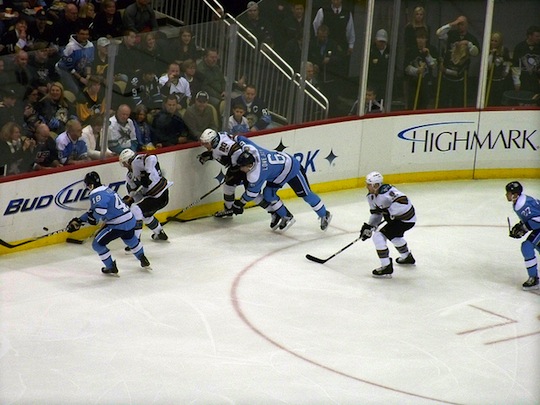Where Diagnosis Meets Disaster: “You’re Out For the Season”
Posted on 01. Sep, 2010 by The Sports Physiotherapist in Assessment, Blog, Diagnosis, Sports Physiotherapy
HOW TO TELL AN ATHLETE THEIR SEASON IS OVER
Let me set the scene for you. You are the sports physiotherapist on the sidelines of your local sporting ground, it is a beautiful sunny day and you are enjoying the match in front of you. Then you watch on as one of your athletes attempts to step off their right foot when their knee gives way and they hit the ground.
Being the sports physiotherapist (and wanting to look the part) you sprint to the aid of the player (who is currently clutching at their right knee). You begin your assessment, most likely followly a TOTAPS pattern, and are likely concerned about significant injury.
“I stepped and it gave way” – check. “The bones moved” – check. “There was a massive pop” – check. You quickly perform your Lachman’s examination and hope to feel the ACL pull taught …. no clunk – check.
The question is what do you say next? How do you tell an athlete their season is over?
THE EXPLANATION
My theory (and I’m sure you can argue this may not be the best one) is that honesty is the best policy. I explain to the player what their likely diagnosis is, I say likely due to the lower diagnostic accuracy of “physiotherapy assessment” techniques, and what that is likely to mean for them. This includes immediate short term management (hospital, specialist/surgical interventions etc) and probable long term clinical pathway. As with all patients in physiotherapy, I never know how much of this information they retain, I think after they hear “ACL” and “Season” the rest is all white noise.
NB: Obviously this conversation is not taking place on the field (referees often have a short fuse).
THE FALLOUT
I have seen mixed results with using this method. Some athletes go quiet whilst others go into “Man Tantrums” including jumping, kicking and screaming. One memory that will always stick with me is that of a 115kg man crying relentlessly in front of the entire team and coaching staff. At this stage it is important to be armed with some little “Gems” that can bring back these athletes from the brink of breakdown (see below).
THE RESEARCH
A research article entitled Down But Not Out: Athlete Responses to Season Ending Injuries (reference and link below) discusses the psychological impact of season ending injuries on athletes. Whilst this make interesting reading, it also gives insight into some of the perceived long-term benefits of injury (thats right – I said benefits). Whilst I am not a psychologist, this knowledge and how to communicate it to your “recovering” athletes is often advantageous in improving their state of mind and commitment to rehab.
The article discusses frequent proposed benefits of:
- Personal Growth Benefits: including improved personality and gaining perspective. You could explain to the athlete that an injury has the potential to give you a more positive outlook on life or gain maturity.
- Psychologically Based Performance Enhancement: including increased toughness and enhanced motivation. Explaining this to the athlete does not include telling them to “harden up”.
- Physical/Technical Development: including improved skill set and increased strength and fitness. You could explain that some athletes find they return following injury a better athlete because of all the gym work they have done.
THE RESULT
Everybody is different and we are all individuals, therefore so will the results. However, hopefully by keeping this content in mind you may improve your communication with the athlete, increase your rapport and ultimately enhance their sports physiotherapy and rehabilitation outcomes.
THE LINKS
Article/Abstract Link: http://www.getcited.org/pub/10334048
For an insight into the thoughts of a season-ending injury:
For more Sports Psychology Texts:
You Might Also Be Interested In








